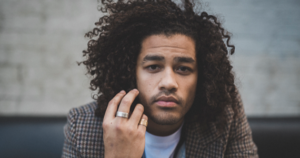“The only thing we can control is our own actions and voice”
12·12·2019

In our very first interview, we got to sit down with Pretty Boy rapper, Ziggy Ramo. Since uploading his debut track Same Script to Triple J’s Unearthed.com in 2017, he’s been on a bit of a trajectory, with his uniquely blunt take on power and race in Australia. Growing up in remote Arnhem Land, regional NSW, Sydney and Perth and with family connections in Far North Queensland, Ziggy gives voice to issues affecting those often unheard.
As he explains, his music is storytelling – the next wave of the indigenous oral tradition, that records the now, his culture, and the politics of the time. Because, as Ziggy says, not taking a stance is a stance.
Here he lets us dig into his history, his process and why he’s now channelling his feels into love and positivity.
Yeah, great. I feel great, man.
I didn’t really start writing and producing music until around fifteen or sixteen.
My brother bought Kanye West’s College Dropout when it first came out, and there’s a track on there called All Falls Down which samples Lauryn Hill’s The Mystery of Iniquity. I remember the first time I heard it. It was so strange, it blew my mind.
As a massive Fugees fan, I knew the song, but also didn’t because of the way Kanye cut it up.
After that, I became obsessed with sampling, which eventually led to writing and producing my own work.
My brother helped out for sure. Around the same time, I realised I could freestyle. He heard me and was like, ‘Just because you can freestyle doesn’t mean you can write’ and vice versa. Your brain and jaw are two different muscles, so you have to train them differently, you know?
So from there, he started sending me book quotes and would be like, ‘Write a song’. I would, then I’d send it to him and he’d pick it apart.
He would question why I wrote certain things or be like, ‘That’s really cool’. That process went on for about a year, while I fine-tuned my instincts.
My dad helped me out a lot as well. When I was 16, he bought me this interface and a mic and I would spend hours learning my voice.
You know, I’m only now a quote, unquote, “new artist”, but I’ve been doing this forever – I’m 25 now.
Yeah, man. Totally!
Yeah, man. I feel like all I can talk about is what I know.
Music is storytelling for my culture and comes from songlines. It’s a record of the times.
Yeah, definitely. Culture is dynamic, it’s fluid. Forever changing. So as an indigenous person, whether I’m writing a song about going to the beach, or my culture – whatever I do comes from that lens.
If we’re not political, what the !@#$ are we?
We live in a political society, you know? Not taking a stance is a stance.
I feel people get so overwhelmed with certain situations in life and feel we can’t do anything, but the only thing we can control is our own actions and voice.
We’re all politically charged, so you’re either part of the problem or solution. If we became less ignorant, and we understand but we don’t make a difference, that’s on us.
It’s not the least we can do, it’s the most.
I grew up going through different cycles of my life, like being super angry and frustrated. But for me, the anger was kind of eating me alive.
Being angry all the time and living your life fuelled by hatred kind of becomes very toxic.
It’s not that I’m any less angry, but it’s just kind of like, for me to cope, I can’t be angry all the time. Now, I just want to express it through love because that’s way more healing.
Yeah, definitely. With music it’s on my terms, it’s like my safe space.
The album is just stories, the stories that I’ve collected, in relation to myself and other people.
We come from a culture of oral history. My story is unique, but a lot of people can relate. I feel like I encompass a lot of Australia’s history. My dad is Indigenous, my mum is non-Indigenous, like I understand both sides of it. So I feel like my story is connected to all Australians.
All good.